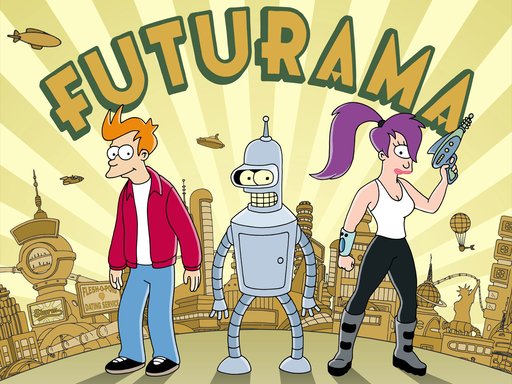Futurama

Futurama is an American animated TV show designed by Matt Groening, creator of The Simpsons, initially launched on March 1999. It features the story of Philip J. Fry, a 25 years old immature yet good-hearted pizza delivery boy who is accidentally cryogenically preserved at the first seconds of the 2000 year and wakes up one millennium later. The show initially ran for four seasons on Fox network until its first cancellation. It was revived a couple of years later as four direct-to-video movies, then the Comedy Central channel produced new seasons and the show eventually ended in 2013, for a total of seven (or height, it depends, sometimes the movies are considered as a season). On 2022, the streaming platform Hulu announced a new 20 episodes series which should premiere in 2023.
December 31st, 1999, New York. Philip J. Fry is a pizza delivery boy who sucks at living. Sent to a delivery just before the new year, he crosses in the street his girlfriend who dumps him right now. Arrived at the client’s place, a cryogenics freezing company, he noticed it was a prank order. His mood worsened, he sit on a chair near a desk, open a beer, and toast to “another lousy millennium” as the new year countdown begin. However, he lost his chair balance and felt into a cryogenic tube that automatically set for 1000 years.
One thousand years later, his tube opens and he discovers he his in what is, for him, the future, on December 31, 2999, in a city now known as New New York rebuilt above the ruins of the previous one. Greeted by the cryogenic company doctors, he is then genetically analyzed and a relative is discovered : his great (x many) great-nephew, Hubert J. Farnsworth (a 150 years-old man). During this examination, he met Leela, a one-eyed alien living on earth and working at the job assignment service. According to his profile, she assigns him a job of delivery boy. However, Fry does not want to be again a loser and run away from the cryogenic office. During his flee and trying to contact his nephew, he met a robot, Bender, near what Fry takes for a phone booth but which is actually a suicide booth. He and Bender escape from the suicide booth and go to a bar. Eventually, after pursuing him, Leela decided to resign from her job because she was heart broken by Fry’s despair. Pursued by the authorities, the gang end up at Professor Farnsworth’s place who introduce them to his activities and his delivery company, Planet Express, used to fund his research. Finally, Fry, Leela, and Bender are hired as the new delivery team for his company.
I’ve discovered Futurama at its first diffusion in France, in 2000 on the Canal+ channel. A decade ago, I’ve bought the DVDs of the series and recently, I’ve wanted to watch it again. And it’s done !
The first thing I’ve noticed is the consistence of the background story. Despite being a bunch of non-connected episodes, the show put in place its continuity at the starting of the first episode. Then, the first season is mainly focused around Fry’s discovery of the future, but it’s adaptation is really fast thanks to his nerdy side. The other thing I’ve noticed is how Fry is handled. This character has two sides which are nicely unrolled. At first, there is his more visible trait : he is immature, dumb, lazy, good-hearted but can be really mean too, stubborn, and any aspect that make him the main comic relief along with Bender. However, his other side is regularly explored during the show with some episodes focus on it : he is a very melancholic character.
Despite coming from an apparent dysfunctional family (his father is an over patriotic Republican cliché believing in conspiracy theories, his mother only cares for sports competitions, and he has a long sibling rivalry with his brother), Fry is often depicted as nostalgic from the 20th Century, but sometimes the episodes focuses on his loneliness. I suppose this character trait is a way to create a connection between him and Leela. Leela is also depicted as a lonely character because she is introduced as an orphan alien who grew up alone in a dingy orphanage on Earth and was mocked because of being a cyclope. I suppose this specific two sides for these characters was a way to make them going closer. Indeed, another recurring growing plotline is Fry falling in love with Leela. But he lacks the charisma to express his feelings and for the most part of the show, his love remains one-sided until Leela accept him. On her side, Leela is more the archetype of the strong willed woman who is also very sensitive and broken inside because of her long time loneliness. The two characters were clearly made to be similar in order to connect them, but the writers gave them the time to discover each other and their relation is slowly created.
The rest of the crew is more stereotyped. Despite being one of the three main characters, Bender is more one sided than the previous ones. He is the antihero of the show and described as an alcoholic egocentric belligerent whore-mongering and chain smoking gambler. However, sometimes the show depicts him as more sympathetic, meaning he is not always a bad person as he likes to claim. Despite his selfishness, Bender is Fry’s best friend and they’re very close (but it won’t be a problem for Bender to sell one of Fry’s kidney to make money…). The Professor is mainly a cliché of an amoral mad scientist completed by the problems inducted by his very old age (he is mainly senile). Amy Wong is the Professor’s intern, a cute ditzy spoiled daughter of an extremely wealthy agriculturalist-industrialist family on Mars. Hermes Conrad is the Jamaican native workaholic bureaucrat that administrates Planet Express, he is usually antipathetic and inhuman as a cliché for an unpleasant administration bureaucrat. The last main recurring character is Dr. Zoidberg, the doctor of Planet Express who is a poor crustacean-like alien that have bad skills and knowledge about human anatomy parodying the idea of the automatic wealth and respect for the doctors. He his, basically, the team’s humiliation subject.
The show developed its characters pasts thanks to a few episodes focused on it. The majority is about Fry and Leela and some were for the Professor and other minors characters. However, episodes about Fry’s past are usually sad as they are focused on his family or about the relatives he lost. For example, the episode about Fry’s dog in Season 4 was rated as one of the saddest episode of the show, with a very gut-pushing ending sequence.
On a more technical appreciation, Futurama is a nicely directed show having a beautiful artistic direction. The series feature great quality CGI integration for the backgrounds and the ships, and even sometimes for the characters, with a smooth and precise rendering. The CGI integration among the traditional 2D-animation is well executed and the show has not aged too badly. The first four seasons where produced in the old 4/3 screen format and the show made its entry to the widescreen format and HD era for the direct-to-video movies and the subsequent seasons. The opening sequence was entirely animated with CGI and, according to Wikipedia, it took approximately one hour to render each frame because it was composed of 80 layers of 3D animation composited together. It featured a starting punch line above the series title (different for each episode) and the end sequence was finished by the ship crashing into a giant screen diffusing a sequence from an old cartoon (this last item was removed in the new seasons).
The other artistic success of Futurama is its musics. The main theme created by Christopher Tyng is played on tubular bells. It’s a beautiful and regularly reused and remixed in the background musics. At first, the crew wanted to remix the theme every episode, but the idea was dropped because of the sound quality of most televisions of the era. Some modified versions were still used during special openings. According to the DVD bonus and an interview of Tyng, the only direction asked by Groening was : “surprise me every week”. On a personal side,I think it’s a success.
So, why I like Futurama ? Unlike The Simpsons (which I haven’t really seen modern episodes, mainly 90’s), the humour is more adult and crude and also very nerdy. As a futuristic Sci-Fi show, Futurama include tons of mathematical and physical jokes like references to quantum physics, Schrodinger’s experience, various cameos of personalities like the late Stephen Hawking. Also, there are tons of references to the most famous Sci-Fi licences : Star Trek, Star Wars, 2001 a Space Odyssey, even Starship Troopers, and many others. Also also, as Fry is a video games nerd, there are a lot of references to classics 90’s games. Of course, the show is also a satyre of the USA depicting Nixon’s head as the new President of Earth using its futuristic setting to explore modern society questions like global warming effects, inclusion of robots in our daily lives, usage of modern technology (an episode parodies the iPhone as the “Eye-Phone” and the usage of social medias), etc.
To conclude, Futurama is a very nice show, very funny with sometimes a more sad and serious episode that bring a kind a balance regarding the show comedy. I’m eager to see what will result of te new season ordered by Hulu.
